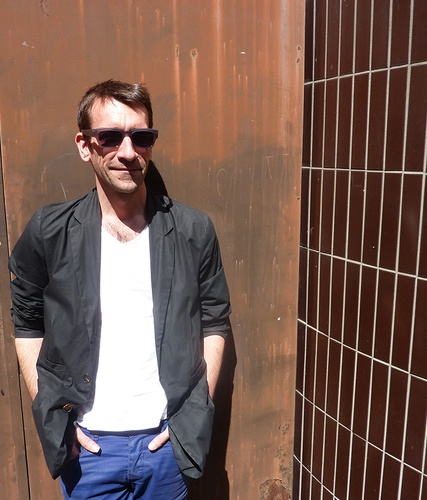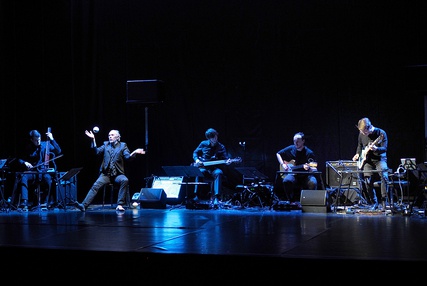Strings in the air with feet over the floor (an exhibition to listen to)
Le guitariste et ses clones
L’une des premières choses qui a titillé le compositeur Benjamin Dupé lorsqu’il a envisagé cette commande pour l’Open Source Guitars, c’est l’effectif de cet ensemble atypique : six guitares. Certes, ces six guitaristes savent jouer de toutes sortes de guitare, de toute taille et de toute forme, électrique ou acoustique, mais leur effectif de référence est bien celui-ci : six instruments identiques, qui ne sont de surcroît pas réellement complémentaires, ni en tessiture ni en timbre, et sont déjà chacun polyphoniques…
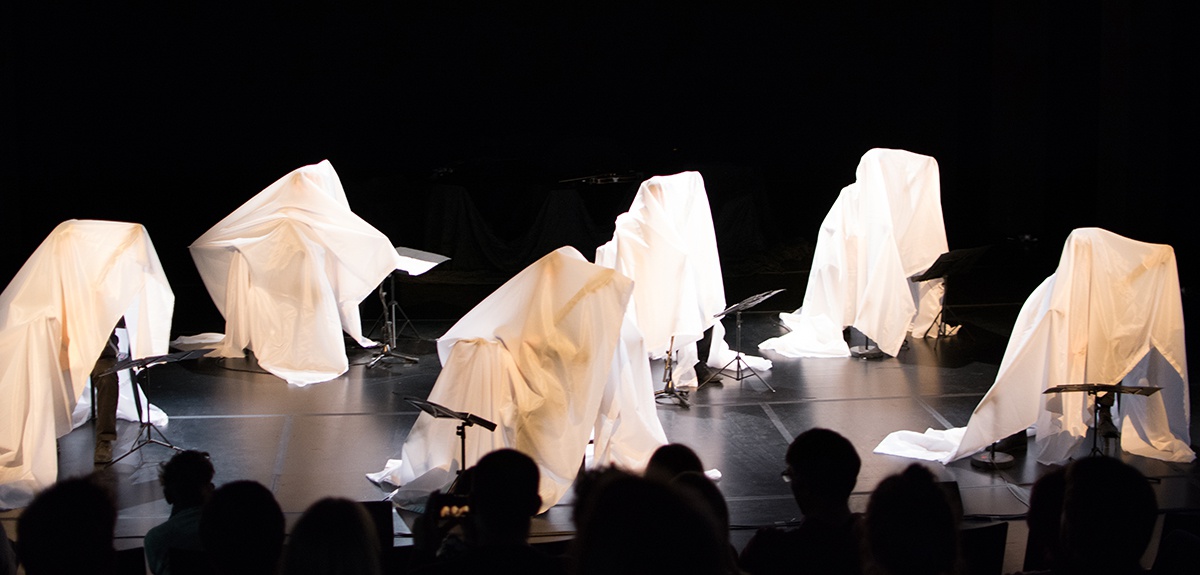
« On a presque l’impression que c’est six fois le même musicien, dit Benjamin Dupé, comme une image de dessin animé, dans lequel un personnage serait répliqué à l’envi. » Cette vision amusée de l’ensemble pour lequel il écrit se retrouve du reste dans la poétique que le compositeur développe à partir de cet ensemble de guitaristes, dont l’audace, l’esprit aventureux et la curiosité pour le théâtre l’ont tout de suite séduit :
« Dès les premiers laboratoires que nous avons menés ensemble à l’Ircam, les guitaristes étaient excités comme des enfants en découvrant tout ce qu’on pouvait faire avec le son qu’ils produisaient. J’ai voulu préserver cette fraîcheur de l’exploration jusque dans la performance, ce plaisir de jouer avec le son vivant et surprenant de l’électronique. Cela vient peut-être du fait que je suis moi-même guitariste et que j’aime beaucoup jouer, au sens ludique du terme, de mon instrument. »
De fait, les transformations électroniques produisent une sorte d’inouï pour l’instrumentiste, susceptible de le replonger dans cette jouissance un peu primaire de la production sonore.
Si elle n’en est pas moins écrite, Strings in the air with feet over the floor (an exhibition to listen to) n’apparaît donc pas « interprétée » aux yeux et aux oreilles du public. Elle se présente plutôt comme un petit théâtre, comme une petite fenêtre ouverte sur une répétition de l’Open Group Guitars, où l’on découvre ses six guitaristes en train de « tester » l’électronique et de jouer avec elle – voire de se « déguiser » grâce à elle, chacun devenant comme un transformiste sonore : ce qui, au passage, nous ramène à l’idée du un et du multiple déjà mentionnée. Une pièce pour six guitaristes et électronique, en somme, qui met en scène ses six interprètes inventant leur musique au présent.
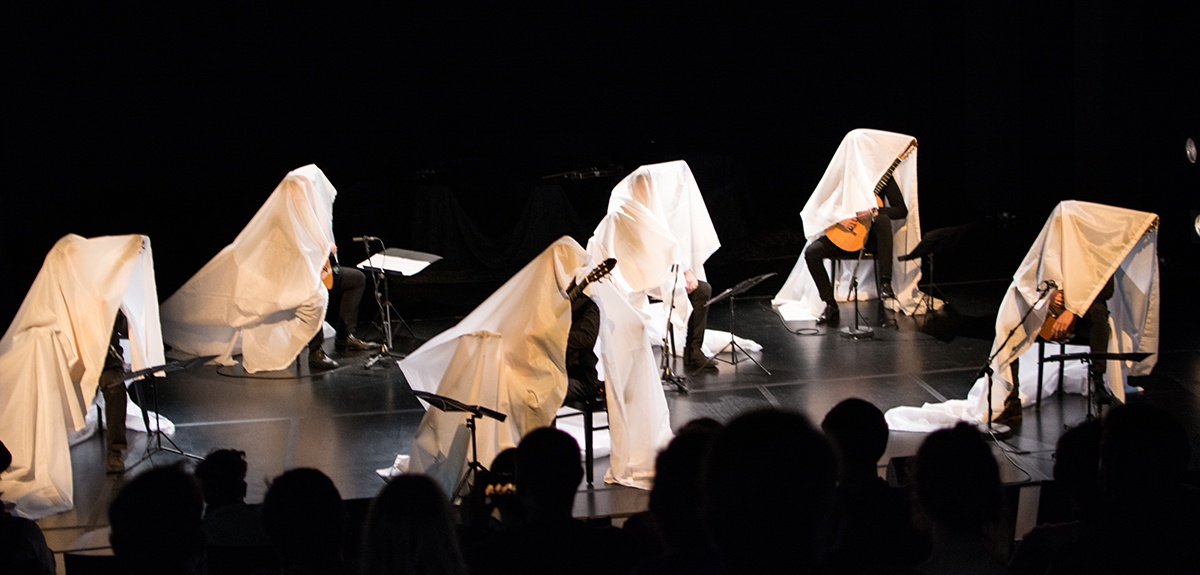
Les enjeux technologiques
Écrire pour l’instrument dont on a joué toute sa vie peut parfois être problématique pour un compositeur : bien sûr, cela suppose une connaissance intime de son comportement acoustique et de ses diverses techniques mais cela signifie également un certain manque de recul.
L’un des avantages du métier de guitariste de Benjamin Dupé est certainement sa capacité à en tirer des textures riches, sans même avoir recours à l’électronique : « Je me souviens que Sébastien Naves, le RIM avec lequel je travaille, avait parfois l’impression que certains échantillons que nous enregistrions étaient déjà bourrés d’effets alors qu’il n’en était rien. Avec six guitares, sans électronique, on peut déjà faire de la synthèse additive en combinant divers gestes instrumentaux, avec des détimbrages ou des émergences successives, ou même des scordaturas (ici les cordes graves des six guitares sont désaccordées, chacune un ton en dessous de la précédente). »
Le principal travail de recherche s’est donc orienté vers des traitements en temps réels qui permettent d’obtenir des sons de nature guitaristique, c’est-à-dire identifiés comme étant produits par une guitare, que la guitare n’est pas capable de produire. Deux exemples emblématiques : des sons tenus (voire qui enflent) – alors que la guitare suit normalement un modèle de percussion/résonance, avec une attaque raide et énergique suivie d’une désinence qui s’éteint rapidement – et des glissendi non chromatiques – alors que la guitare est un instrument à frettes, rendant tout glissendo impossible, du moins pas selon un processus continu. Pour cela, le son de la guitare est capté juste après l’attaque, et grâce à diverses techniques (par réverbération infinie, ou par analyse spectrale suivie d’une synthèse sonore), exploité immédiatement par l’électronique. « Ces traitements en temps réel me permettent d’explorer d’autres mondes acoustiques. Mais d’autres procédés parfois bien plus prosaïques suffisent parfois à cela : comme de faire monter et descendre un diapason (que nombre de guitaristes gardent dans leurs boîtes de guitare pour s’accorder) devant un micro, ou de manipuler les cordes avec divers objets… Ou même de donner de la voix dans le micro ! »
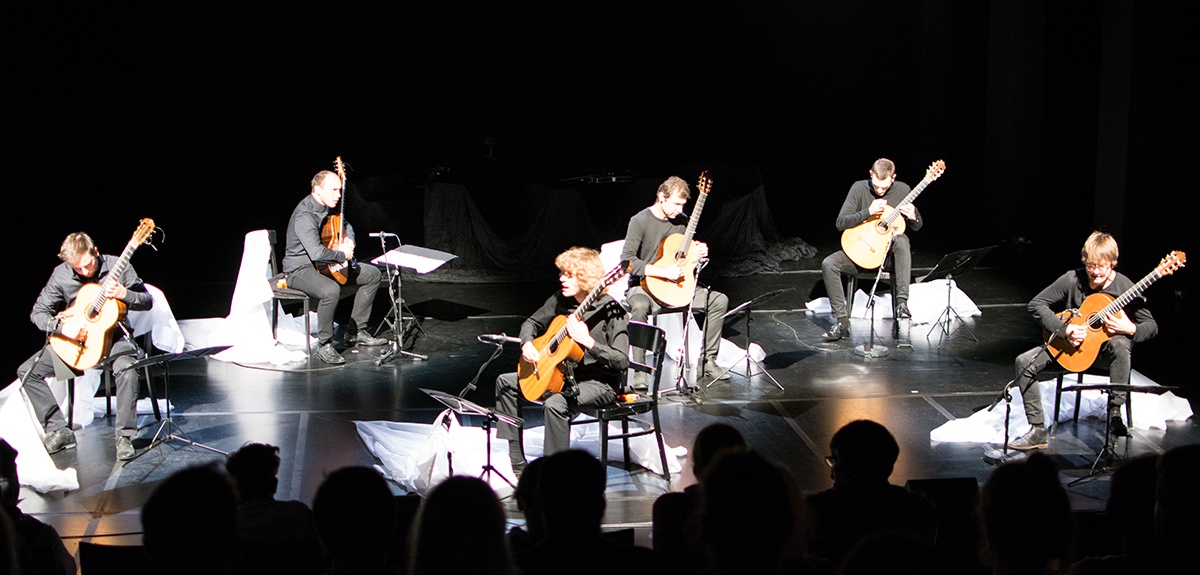
Précédent projet à l'Ircam
Il se trouve que les oreilles n’ont pas de paupières, théâtre musical d’après La Haine de la musique de Pascal Quignard (2015)
Biographie
Benjamin Dupé
Compositeur (né en 1976)
Compositeur, guitariste et metteur en scène, formé au Conservatoire de Paris, Benjamin Dupé se consacre à la création musicale au sens large : écriture instrumentale, vocale ou &eac…




